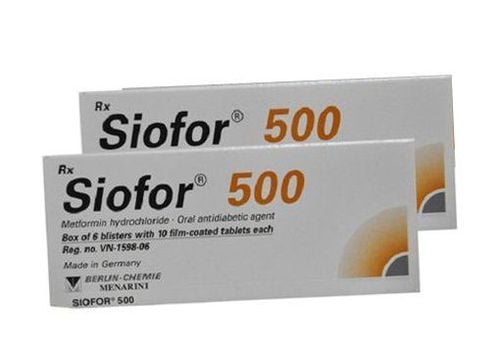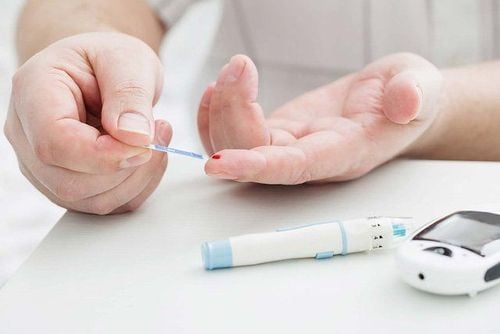During the process of taking medication to treat type 2 diabetes, some patients may accidentally miss a dose. Missing a dose can reduce the effectiveness of the medication and even lead to other potential health risks. So what should you do if you forget to take your type 2 diabetes medication?
1. Understanding Common Medications for Type 2 Diabetes
When diagnosed with type 2 diabetes, your doctor will initially prescribe insulin or other medications to help you manage your blood sugar levels. Additionally, they may recommend lifestyle changes such as dietary modifications, weight loss, and exercise.
If these measures are not enough to lower blood sugar levels to normal, the doctor may prescribe other medications to address this condition. Diabetes medications work in various ways to reduce blood sugar levels, including:
- Slowing down the absorption of sugar from the foods you eat.
- Reducing the amount of sugar released from the liver.
- Improving your body's response to insulin.
- Stimulating the pancreas to produce more insulin.
- Preventing the absorption of sugar from the intestines and the reabsorption of glucose from the blood filtered by the kidneys.
Commonly used medications for type 2 diabetes include:
- Metformin:
- Bile acid sequestrants: such as colesevelam (Welchol)
- Alpha-glucosidase inhibitors: such as miglitol (Glyset) and acarbose (Precose)
- Meglitinides: such as repaglinide
- DPP-4 inhibitors: such as saxagliptin (Onglyza), linagliptin (Tradjenta), and sitagliptin (Januvia)
- SGLT2 inhibitors: such as dapagliflozin (Farxiga), canagliflozin (Invokana), and empagliflozin (Jardiance)
- Oral GLP-1 receptor agonists: such as Rybelsus
- Thiazolidinediones: such as pioglitazone
- Sulfonylureas: such as glimepiride
- Combination therapy, involving two or more of the above medications.
2. What are the consequences of missing a type 2 diabetes medication dose?
If your blood sugar levels have been within a normal range recently and you're following a healthy diet and lifestyle, missing a single dose of diabetes medication may not significantly impact your blood sugar control. However, if you miss several doses or don't follow your doctor's dietary and lifestyle recommendations, it can increase your risk of high blood sugar.
Generally, your blood sugar level may exceed 180 mg/dL about 2 hours after starting a meal, or be above 130 mg/dL before a meal. High blood sugar levels can lead to symptoms such as blurry vision, fatigue, frequent urination, extreme thirst, or slow-healing sores.
Experts warn that frequently missing doses of type 2 diabetes medication can lead to serious health complications and even be life-threatening. Some potential complications of poorly controlled type 2 diabetes include nerve, kidney, heart, and eye damage. These conditions can worsen if the patient continues to miss their medication.
3. Steps to take if you miss a dose of type 2 diabetes medication
If you accidentally miss a dose of diabetes medication, try to take it as soon as possible after realizing it. However, if it has been a few hours since the missed dose and the time for the next dose is near, it is best to skip that dose and take the medication according to the regular schedule. Do not double the dose, as this can lead to overdose symptoms or unwanted side effects.
Additionally, you can discuss with your doctor the specific diabetes medication you are using and how to use it most effectively. Usually, most medications for any condition come with a label and specific instructions on what to do if you miss a dose. Therefore, before using diabetes medication, you need to read the instructions carefully and follow the treatment schedule prescribed by your doctor.
4. When to inform your doctor?
Patients should inform their doctor if they have any questions or concerns about the diabetes medication they are taking or other suspected symptoms. Below are some warnings during diabetes drug treatment that all patients should be aware of:
Inform your doctor if you have hyperglycemia symptoms
After forgetting to take your type 2 diabetes medication and noticing the onset of symptoms of high blood sugar such as decreased vision, constant thirst, increased urination, etc., patients should quickly contact their doctor to schedule a health check-up. Failure to detect and treat high blood sugar symptoms promptly can cause type 2 diabetes to worsen, leading to many dangerous health consequences for patients later.
Inform your doctor if the patient intentionally skips doses
In some cases, patients with type 2 diabetes may deliberately skip doses due to fear of side effects or to save on treatment costs. Ideally, patients should discuss their concerns with their doctor to find more suitable options for controlling their diabetes.
Currently, there are many different types of diabetes medications, some of which are more easily and quickly absorbed by the body than others. Additionally, there are some less expensive diabetes treatment options compared to other medications prescribed for patients.
Moreover, patients with type 2 diabetes should note that side effects only occur in the first few weeks after starting medication. Taking diabetes medication with meals can also help reduce gastrointestinal (GI) side effects that commonly occur in the first few weeks of treatment.
Inform your doctor if you forget a dose due to having too many medications to take in a day
If you forget to take your diabetes medication because you have too many other medications to take daily, it's best to tell your doctor so they can create a more suitable medication schedule and plan. Your doctor may suggest prescribing a combination oral medication that includes multiple medications. This may be a suitable solution to help you reduce the number of pills you have to take each day, while also making it easier to track your medication schedule.
5. Some tips to help you remember your diabetes medication schedule
Following a medication schedule can be difficult for many patients, especially those who have to take a combination of medications to control type 2 diabetes and other health conditions. Here are some tips to help you reduce missed doses and remember your medication schedule more effectively:
- Organize your medications in a pill box with separate compartments for each day's medication.
- Set alarms or reminders to take your medication on your phone or other smart device.
- Write your medication schedule on a sticky note and put it on the wall or refrigerator.
- Take your diabetes medication at the same time each day while doing another routine such as brushing your teeth, eating breakfast, or before going to bed.
- Keep your pill bottle in an easy-to-see place to remind yourself to take your medication.
- Ask a friend or family member to remind you about your medication schedule.
Additionally, you should also talk to your doctor about the timing of your type 2 diabetes medication to reduce unpleasant side effects. When you experience fewer side effects, it will help patients adhere more closely to their treatment regimen.
To arrange an appointment, please call HOTLINE or make your reservation directly HERE. You may also download the MyVinmec app to schedule appointments faster and manage your reservations more conveniently.
Reference source: healthline.com













